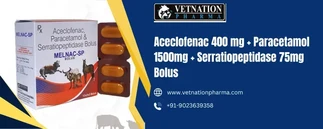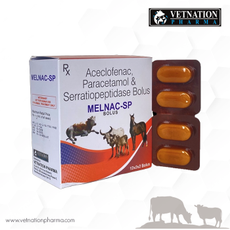Aceclofenac 400 mg + Paracetamol 1500mg + Serratiopeptidase 75mg Bolus : Vetnation Pharma
In veterinary medicine, managing pain, inflammation, and swelling in animals is crucial for their well-being and recovery from various conditions. One of the most effective combinations for addressing these issues is the Aceclofenac 400 mg + Paracetamol 1500mg + Serratiopeptidase 75mg Bolus. This powerful combination of anti-inflammatory, analgesic, and enzyme therapy is widely used to treat a range of conditions in livestock and companion animals. In this blog, we’ll explore the uses, benefits, and applications of this bolus in veterinary care, helping you understand why it’s a go-to solution for veterinarians.
Understanding the Components of the Bolus
The Aceclofenac 400 mg + Paracetamol 1500mg + Serratiopeptidase 75mg Bolus combines three potent ingredients, each with a specific role in managing pain and inflammation:

1. Aceclofenac 400 mg
Aceclofenac is a non-steroidal anti-inflammatory drug (NSAID) that is widely used in veterinary medicine to relieve pain and reduce inflammation. It works by inhibiting the action of cyclooxygenase (COX) enzymes, which are responsible for the production of prostaglandins—compounds that mediate inflammation, pain, and fever. By reducing the production of prostaglandins, Aceclofenac helps alleviate pain and swelling in animals.
2. Paracetamol 1500 mg
Paracetamol (also known as acetaminophen) is an analgesic and antipyretic agent that is commonly used to relieve pain and reduce fever. In veterinary medicine, Paracetamol is used for its pain-relieving properties, making it an ideal addition to the bolus for managing mild to moderate pain in animals. Unlike NSAIDs, Paracetamol does not have significant anti-inflammatory effects, but it enhances the analgesic effect of Aceclofenac.

3. Serratiopeptidase 75 mg
Serratiopeptidase is a proteolytic enzyme that has potent anti-inflammatory, anti-edemic (reducing swelling), and fibrinolytic (breaking down fibrin, a protein involved in blood clotting) properties. It helps reduce inflammation and swelling by breaking down proteins that accumulate at sites of injury or inflammation. Serratiopeptidase is particularly useful in conditions where inflammation and edema are prominent, as it enhances tissue healing and recovery.
